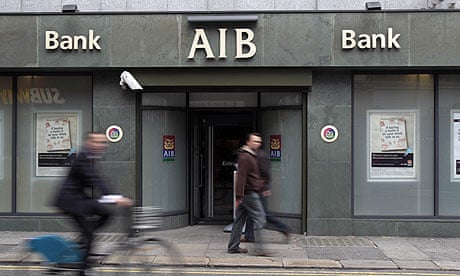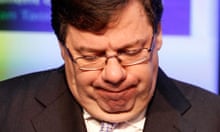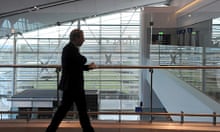Ireland's financial woes deepened today after its second-largest bank revealed that an enormous outflow of funds during the year had tripled its reliance on central bank funding.
During a day of feverish speculation over the size of the bailout being negotiated by the Irish government with the EU and International Monetary Fund, Allied Irish Banks reported that its dependence on "monetary authorities" had risen to €27bn (£23bn) from below €10bn in June.
The bank admitted it was increasingly reliant on central bank funding after suffering €13bn of outflows this year, matching the large loss of funds reported earlier by the country's largest bank, Bank of Ireland. In a gloomy statement, the bank, which is now more than 90% state-owned, said: "The outlook in our markets is uncertain with additional stress likely from the implementation of the Irish and UK budgets. We are carefully and thoroughly assessing these impacts and market conditions."
Irish ministers and officials from the EU and IMF began talks today over a possible €100bn bailout that would secure government debts, which have rocketed since it agreed to underwrite the country's five main banks.
Ministers, including the prime minister Brian Cowen, have consistently maintained the country remains solvent and self-financing. But last week interest rates on Irish government debt jumped to record levels on fears that the banking sector's debts would overwhelm the state's finances next year.
Investors fear a government programme of spending cuts and tax rises will accelerate the number of households and businesses reporting bad debts in 2011, which in turn will hit the banks.
Amid speculation that EU and IMF officials were prepared for protracted negotiations after allegedly booking a suite of rooms at a five-star Dublin hotel for the next three weeks, concern grew that the price of Ireland's bailout would be a loss of control over its tax rates and budget.
The finance minister, Brian Lenihan, denied rumours that he was preparing to raise Ireland's much-cherished corporation tax rate of 12.5% to nearer the EU average as the price of loans and guarantees from the EU and IMF. His position was undermined by the central bank governor, Patrick Honohan, who broke ranks in an interview with the broadcaster RTÉ to say he expected a deal to go ahead. "The expectation is that negotiations will be effective and a loan will be made available and drawn down as necessary," he said.
"The ECB would not send large teams if they didn't believe first of all that this was something they could agree to … that there is a programme that is fully acceptable to them that could be designed and that is likely to be accept to Irish government and Irish people."
Cowen defended his government's decision to underwrite the banks, insisting it was the only sensible route to prevent a collapse in confidence and a devastating bank run.
But Eamon Gilmore, the leader of the opposition Labour party, said Ireland had suffered the darkest week in its history since the Civil War nearly 90 years ago.
The pressure group Debt and Development Coalition Ireland (DDCI), which was formed in the aftermath of the financial crisis, argued that the IMF had frustrated efforts to deliver justice and failed the poorest people in countries around the world.
Nessa Ní Chasaide, DDCI co-ordinator, said: "The notion that the IMF is needed to promote 'tough love' in crisis situations, whether in impoverished countries or in Ireland, is deeply misleading, as governments must first and foremost account to their citizens when making decisions that will affect their everyday lives.
"Since joining the IMF in 1957, Ireland has stood by as the IMF impoverished countries around the world. As Ireland and other eurozone countries now face a similar prospect, it is high time to end the undue and damaging influence of such an undemocratic financial institution."
Irish lenders have become more reliant on European Central Bank funding after being frozen out of wholesale markets. The amount of ECB loans to the country's banks rose 7.3% from the previous month to €130bn in October, according to Ireland's central bank.
AIB's deposits fell from €74bn to €61bn during the year. The bank also admitted it would need a cash injection of €6.6bn from the government to prop up its capital reserves, up from €5.4bn, after it abandoned the sale of its UK businesses.




